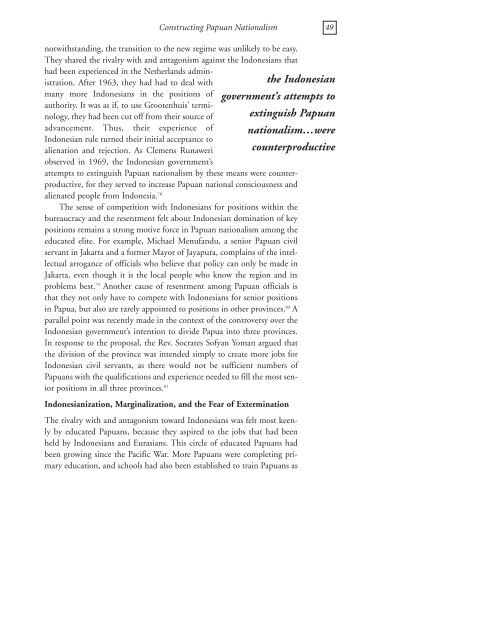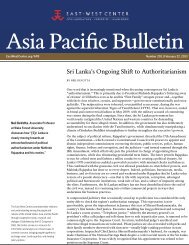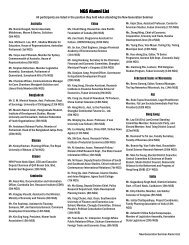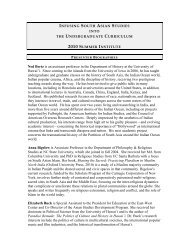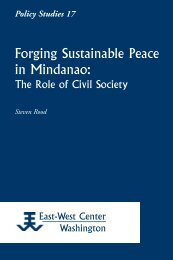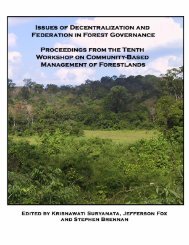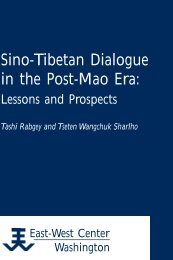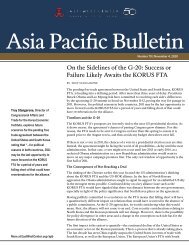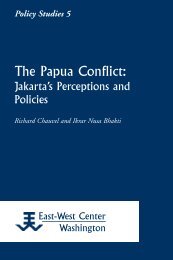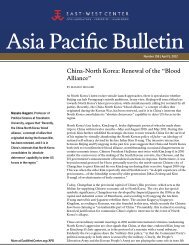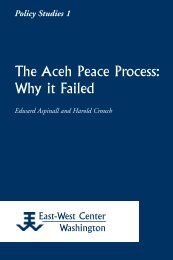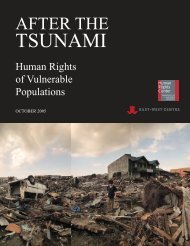Constructing Papuan Nationalism: History, Ethnicity ... - ScholarSpace
Constructing Papuan Nationalism: History, Ethnicity ... - ScholarSpace
Constructing Papuan Nationalism: History, Ethnicity ... - ScholarSpace
- No tags were found...
Create successful ePaper yourself
Turn your PDF publications into a flip-book with our unique Google optimized e-Paper software.
<strong>Constructing</strong> <strong>Papuan</strong> <strong>Nationalism</strong> 49notwithstanding, the transition to the new regime was unlikely to be easy.They shared the rivalry with and antagonism against the Indonesians thathad been experienced in the Netherlands administration.After 1963, they had had to deal withmany more Indonesians in the positions ofauthority. It was as if, to use Grootenhuis’ terminology,they had been cut off from their source ofadvancement. Thus, their experience ofIndonesian rule turned their initial acceptance toalienation and rejection. As Clemens Runaweriobserved in 1969, the Indonesian government’sattempts to extinguish <strong>Papuan</strong> nationalism by these means were counterproductive,for they served to increase <strong>Papuan</strong> national consciousness andalienated people from Indonesia. 78The sense of competition with Indonesians for positions within thebureaucracy and the resentment felt about Indonesian domination of keypositions remains a strong motive force in <strong>Papuan</strong> nationalism among theeducated elite. For example, Michael Menufandu, a senior <strong>Papuan</strong> civilservant in Jakarta and a former Mayor of Jayapura, complains of the intellectualarrogance of officials who believe that policy can only be made inJakarta, even though it is the local people who know the region and itsproblems best. 79 Another cause of resentment among <strong>Papuan</strong> officials isthat they not only have to compete with Indonesians for senior positionsin Papua, but also are rarely appointed to positions in other provinces. 80 Aparallel point was recently made in the context of the controversy over theIndonesian government’s intention to divide Papua into three provinces.In response to the proposal, the Rev. Socrates Sofyan Yoman argued thatthe division of the province was intended simply to create more jobs forIndonesian civil servants, as there would not be sufficient numbers of<strong>Papuan</strong>s with the qualifications and experience needed to fill the most seniorpositions in all three provinces. 81the Indonesiangovernment’s attempts toextinguish <strong>Papuan</strong>nationalism…werecounterproductiveIndonesianization, Marginalization, and the Fear of ExterminationThe rivalry with and antagonism toward Indonesians was felt most keenlyby educated <strong>Papuan</strong>s, because they aspired to the jobs that had beenheld by Indonesians and Eurasians. This circle of educated <strong>Papuan</strong>s hadbeen growing since the Pacific War. More <strong>Papuan</strong>s were completing primaryeducation, and schools had also been established to train <strong>Papuan</strong>s as


